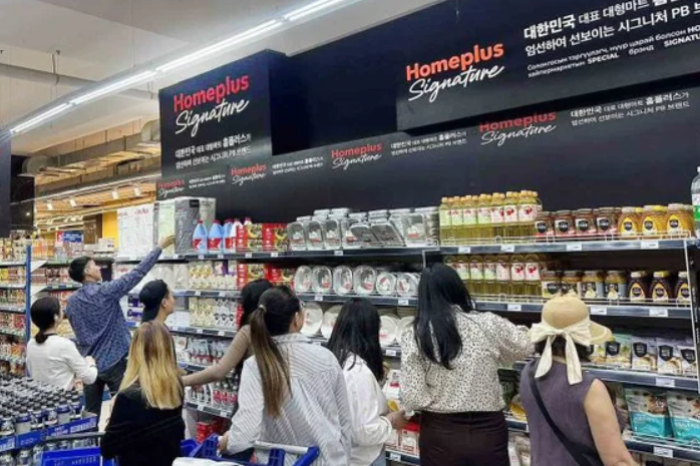Retail
Korean retailers boost Mongolia presence with new stores, products
They are partnering with local distributors for stable operations in Mongolia where Korean products are growing in popularity
By Sep 12, 2023 (Gmt+09:00)
2
Min read
Most Read
Samsung steps up AR race with advanced microdisplay for smart glasses


When in S. Korea, it’s a ritual: Foreigners make stops at CU, GS25, 7-Eleven


Maybe Happy Ending: A robot love story that rewrote Broadway playbook


NPS yet to schedule external manager selection; PE firms’ fundraising woes deepen


US auto parts tariffs take effect; Korea avoids heavy hit



South Korean retail giants are advancing into Mongolia where Korean food and daily necessities are gaining in popularity among local consumers. Big-box retailers like Homeplus Co. and E-Mart Inc. and convenience stores have expanded their businesses and launched private labels in Mongolia to attract customers who seek out Korean products.
Homeplus said on Monday it has entered the Mongolian market by supplying its private label items to local trading firm Circle Group’s big-box stores. The Korean supermarket chain will provide about 200 products under Homeplus’ own brand, including processed food, toilet paper and wet wipes, to 14 stores in Ulaanbaatar for two years.
It is the first time for Homeplus to partner with an overseas distributor under a two-year contract for such a large amount of products, the Korean supermarket chain said. It has sold about 10 private label items in China, Singapore and the Philippines under shorter-term contracts since 2012.
Homeplus sees huge potential in Mongolia as the country’s manufacturing sector remains relatively small, resulting in its heavy reliance on imported goods. It is a great market in which to private label products featuring good quality at reasonable prices, a Homeplus official said.
The big-box store chain will add chilled and frozen food to the supplies next year and plans to open its own large grocery store in Mongolia in the long term.
Homeplus aims to reduce overseas business risk by selling products first, instead of launching a physical store, industry sources said. Korea’s top hypermarket chain E-Mart entered China with its first store in Shanghai in 1997 but withdrew from Asia’s No. 1 market in 2017 due to accumulated losses.
E-Mart opened its hypermarket in Ulaanbaatar in 2016, becoming the first Korean supermarket chain to enter the country.
The retail unit of Shinsegae Group launched its fourth hypermarket in the capital earlier this month. The new hyperarket includes clothing stores, a bookstore, a food court, franchise restaurants as well as a large supermarket that sells Korean food and necessities.
Korea’s leading convenience store chains CU and GS25 launched businesses in Ulaanbaatar in 2018 and 2021, respectively. As of the end of August, CU and GS25 operate 336 and 231 stores in Mongolia, respectively.
They run the Mongolian businesses via a master franchise, a relationship that grants the local franchisee operating and trademark rights, while the franchisor, entering a new market, controls the quality of products and services. More Korean retailers are aware that this strategy reduces risk when launching an overseas business, an industry source said.
Write to Hun-Hyoung Ha at hhh@hankyung.com
Jihyun Kim edited this article.
More to Read
-

-
 Corporate investmentLG Electronics breaks ground on $600 mn home appliance plant in India
Corporate investmentLG Electronics breaks ground on $600 mn home appliance plant in India13 HOURS AGO
-

-
 E-commerceCoupang’s Q1 revenue up; quarterly dip signals rising competition
E-commerceCoupang’s Q1 revenue up; quarterly dip signals rising competitionMay 07, 2025 (Gmt+09:00)
-
 Asset managementKorea Investment & Securities deepens global ties with 2nd IR in New York
Asset managementKorea Investment & Securities deepens global ties with 2nd IR in New YorkMay 07, 2025 (Gmt+09:00)
Comment 0
LOG IN


